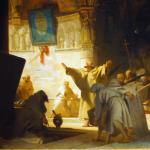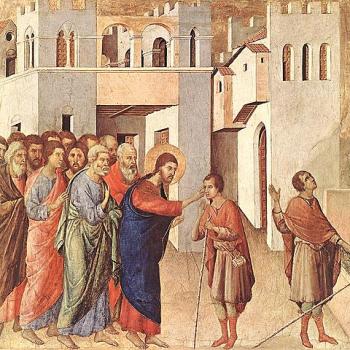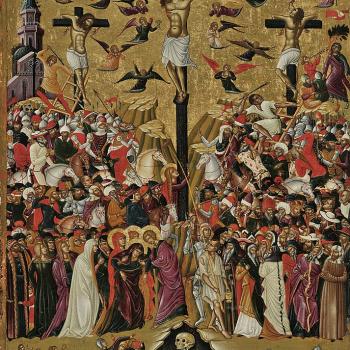
It is easy to miss, in the midst of his words indicating that circumcision was not meant for all, that Paul called it a good thing; what he did not think was good was forcing it upon every male convert. God’s intentions were not for everyone to be circumcised, but to use it as a sign and as a vessel of grace for the people of Israel. What Paul didn’t want was for people to exaggerate that good, to make more of it than God intended. He understood that no particular good, no matter how good a thing it was, should be turned into something it was not. Its goodness should not be devalued, but it should also not be confused as being a greater good than it was, for when that happened, those who engage it could embrace it so much that they end up circumventing the greater good established by Jesus on the cross. For he recognized all human goods could and should be recognized as good so long as they were not abused, as long as they were not treated as being greater goods than they actually were, which is what happens when one tries to use such goods beyond their proper context (and the boundaries associated with that context):
It is those who want to make a good showing in the flesh that would compel you to be circumcised, and only in order that they may not be persecuted for the cross of Christ. For even those who receive circumcision do not themselves keep the law, but they desire to have you circumcised that they may glory in your flesh. But far be it from me to glory except in the cross of our Lord Jesus Christ, by which the world has been crucified to me, and I to the world. For neither circumcision counts for anything, nor uncircumcision, but a new creation (Gal. 6:12-15 RSV).
Circumcision was and can still be seen as a good, when practiced appropriately, but when it is used merely for some earthly glory, as a way to feel superior to others, it is cut off from its intended purpose. It can and did serve as a special sign for the people of Israel, but as such, it was not intended for everyone. Paul continued to see it held special value, which is why he also didn’t think it should be forced upon converts, for they were not of the people of Israel. Circumcision was a sign representing Israel’s covenantal relationship with God. Gentile converts to the faith had a different kind of relationship with God, and so they should not be seen as under the Mosaic covenant. And with that, Paul also wanted to make it clear that those who were circumcised should not use it as a thing to boast, as if it were a sign of their own glory. This is why Paul pointed out that true glory, true greatness, lies not in good things we pick up and use in order to make ourselves appear great, but in the cross and the way of the cross. We are not to boast of ourselves, nor should we try to set ourselves apart from others thinking we are their superiors; instead, we are to follow the simple, self-giving, indeed, kenotic path of love, allowing true glory to be revealed in our love and humility.
We can’t do all things all by ourselves. We can’t just pick ourselves up and storm our way into heaven. “No one has ascended into heaven but he who descended from heaven, the Son of man” (Jn. 3:13 RSV). Embracing particular goods can be good, when done in the right context, and with the right spirit. But if we ignore the greater good, and the way it has been revealed to us through the cross, we are likely to elevate and universalize particular goods, trying to impose them upon those they were not intended for, causing great pain and sorrow as a result. This is what happened with those who tried to force Christian converts to be circumcised. It is also what happens when we try to universalize and force particular cultural norms upon others. They can have value, and can be put in practice as long as the good remains, but when they are turned against the greater good, used to create boasts against others, indeed, when they are used by cultural and racial supremacists, then our response must be to object, pointing out how the good has been subverted and used for evil. We must, like Paul, respond by looking to promote and help those who would be harmed by such attempts of cultural supremacy. “Peace and mercy be upon all who walk by this rule, upon the Israel of God” (Gal. 6:17 RSV). Can we not learn this lesson, for example, in the life of St. Theodora of Alexandria, a woman who dressed and lived her life as a monk? She understood cultural norms which affected women often were abusive and had to be overridden by action, and that is what she did when she became an ascetic and took her place in the monastic community as if she were a man; it was not without trouble, for, not only was she believed to be a monk, she was accused of fathering a child by a woman who visited the monastery. St. Theodora embraced the glory of the cross, and the power of love so much, she was willing to accept the false accusation, that is, was willing to have people believe them and raised the child as if she were its father. It was only in her death that her secret was revealed, and the people who put her down marveled at her and all that she had endured, being a woman who lived her life as a man; she had embraced the cross and received the reward of it, not from man, but from God. All of that would have been impossible if she had followed the cultural norms which would have told her not to dress or act like she were a man.
Jesus was lifted up on the cross by his kenosis. He let himself be taken in by humanity, allowing us to do whatever we wanted to do with him. In theory, that did not mean we had to crucify him, but the sin which connected humanity together and centered itself in the power held by Pilate, and took all its rage out on Jesus. Thus, Jesus was led to the cross so that he could die as if he were a criminal. The darkness of sin tried to overcome the light, and God’s love allowed that to happen. And in this way, on the cross, we were shown the fullness of God’s love, how great it is, how indeed, it is greater than all the sin in the world. It could and would endure all. Sin was limited, God’s love is not. Thus, sin could only go so far before it was overcome. It was love which gave sin its freedom to do all that it wanted to do. It was love which revealed the limits of sin. It was love, therefore, which survives and transcends sin and its sting with death. Jesus emptied himself of all earthly glory, of all particular goods, so that what was to remain once sin had its way was the greater glory and love of God, and in this way, he was raised up and glorified. “And as Moses lifted up the serpent in the wilderness, so must the Son of man be lifted up, that whoever believes in him may have eternal life” (Jn. 3:14-15 RSV). The necessity lay not that God could not save humanity in another fashion, but that for God to save humanity in such a way as to preserve human freedom, humanity needed to act as it saw fit, to express all the evil within, so that the evil could runs its course to the end, all on its own. It could be said that on the cross and in his death and resurrection, Jesus performed his exorcism upon creation; once sin had been overcome, we are shown what is to come next, the new creation in which evil has been removed and all that is to come is good and glorious. Everything is brought together, from all time and space, and made one as it is raised up with Jesus so that it can be taken into the kingdom of heaven. And so, the cross continues to show us the way, the path which transcends human glory, the path which helps us also exorcise whatever evil defiles us, so that once it has come to an end within us, we can then find ourselves totally brought over to the new creation and be raised by Jesus, which is when we shall realize our place in the eternal kingdom of God.
Stay in touch! Like A Little Bit of Nothing on Facebook.
If you liked what you read, please consider sharing it with your friends and family!













